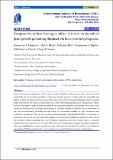Prospects for soilless farming in Africa: A review on the aids of plant growth-promoting rhizobacteria inoculants in hydroponics

View/
Date
2022-11-21Author
Margaret, Gumisiriza
Becky, Aloo
Billy, Makumba
Baptist, Tumuhairwe
Patrick, Ndakidemi
Ernest, Mbega
Metadata
Show full item recordAbstract
273 Margaret et al.
Int. J. Biosci. 2022
REVIEW PAPERREVIEW PAPERREVIEW PAPERREVIEW PAPER OPEN ACCESSOPEN ACCESSOPEN ACCESSOPEN ACCESS
Prospects for soilless farming in Africa: A review on the aids of
plant growth-promoting rhizobacteria inoculants in hydroponics
Gumisiriza S. Margaret*1, Aloo N. Becky2, Makumba Billy3, Tumuhairwe J. Baptist4,
Ndakidemi A. Patrick1, Mbega R. Ernest1
1School of Life Sciences and Bioengineering, The Nelson Mandela African Institution of Science and
Technology, Arusha, Tanzania
2School of Science, University of Eldoret, Eldoret, Kenya
3School of Science, Moi University, Eldoret, Kenya
4Makerere University, College of Agricultural and Environmental Sciences,
Department of Agricultural Production, Kampala, Uganda
Key words: Hydroponics, Nutrient solubilization, Soilless culture, PGPR, Urban farming
http://dx.doi.org/10.12692/ijb/21.5.273-282 Article published on November 21, 2022
Abstract
Due to the growing population in Africa, there is need to identify farming systems that can increase food
productivity for the increasing population. Hydroponic farming presents a viable option for sustainable and
climate resilient agricultural production especially in areas faced with environmental challenges such as; limited
arable land and has the ability to realize global food security the rising population and urbanization in Africa.
However, the supply of plant nutrients in sufficient and sustainable quantities at affordable costs is one of the
critical and limiting factors in adoption of hydroponics. Chemical hydroponic fertilizers that are often used are
not only environmentally unfriendly but also costly and less-readily available. As such, alternative crop
fertilization mechanisms like the use of plant growth-promoting rhizobacteria (PGPR) as inoculants in
hydroponics are not only an environmentally feasible but also economical solution for countries in Africa. There
are numerous studies regarding this crop-fertilization mechanism, but these mainly refer to controlled
environment such as; green-houses, and field tests. Their use in hydroponic farming is still largely unexploited.
This review highlights the nutrient requirements, types and benefits of hydroponics in addition to unraveling the
potential that PGPR inoculants hold as a sustainable and economical fertilizer alternative in hydroponics.
URI
http://dx.doi.org/10.12692/ijb/21.5.273-282https://dspace.nm-aist.ac.tz/handle/20.500.12479/2440
